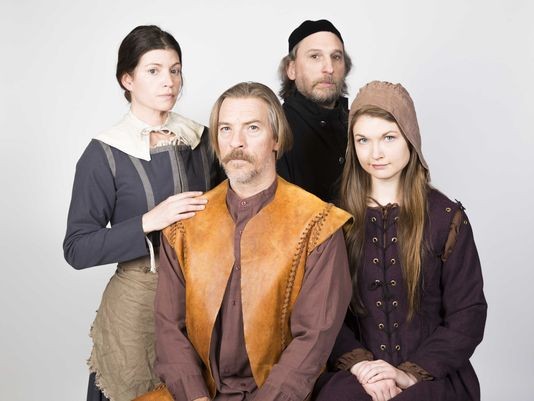Ominous burlap giants loom over the stage and stare facelessly at guests as they enter Shamblin Theater.
These statues set the mood for Lipscomb University and Blackbird Theater’s combined performance of Arthur Miller’s The Crucible, which opened Friday night.
The controversial play, set in 1690s Salem, Massachusetts during the witch trials, tells the fictional story of the town’s reaction toward a group of teen girls caught participating in an innocent conjuring. The girls soon name other women involved in the “satanic” behavior and the court convicts many for hanging.
Producer Beki Baker shared in her director’s note that The Crucible’s dark portrayal of the early American event still provides relevant themes that “continue to reverberate throughout time.”
“This play serves more than to point fingers at religious figures and political systems for over 300 years ago,” she said. “On both macro and micro-levels, we all behave like the Puritans did that fateful spring. And the truth is, we all pay the price.”
At Sunday’s show, Lipscomb students had their first of three opportunities to earn chapel credit for attending and staying afterward for a post-play discussion.
Dr. Randy Spivey, Academic Director for Lipscomb’s Institute of Law, Justice and Society, joined the audience for the question and answer session to shed light on the play’s narrative on current American law and society.
“We are always the brink of this hysteria,” he said, relating the chaos in the play to the nation today. “And we almost always condemn, crucify and isolate the things that we are afraid of and the things that we don’t understand.”
Just as characters in the play find fault in the supposedly demon-possessed women, Spivey said he feels the United States often addresses minority groups with the same type of unjust scrutiny.
“We incarcerate more people per capita than any other country on earth, and mostly people of color,” Spivey said. “Anyone who is outside of the majority, this is what we have done.”
On top of the talk-back session, Lipscomb theater students said they felt college students can learn from viewing plays in general.
Senior musical theatre major Sarah Zanotti who played Mary Warren said she hopes students can see straight play theater as a valuable art form just like drawing or sculpting.
“Coming into this show, I had only done musicals and straight play had no appeal to me in a lot of ways,” she said. “My biggest hope is that [students] won’t judge a piece of art and they’ll take it in and can support straight theater.”
Students can catch the show again for chapel credit Feb. 25 and 28.
Photo courtesy of Lipscomb Department of Theatre and Blackbird Theatre

